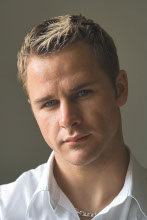Interview: Alex Birch of CORRUPT
 As part of our exploration of American politics, we’re interviewing some of the up and coming figures of American politics. Today’s interview is with Alex Birch, a writer and activist with CORRUPT, a think-tank for reversing modern decline.
As part of our exploration of American politics, we’re interviewing some of the up and coming figures of American politics. Today’s interview is with Alex Birch, a writer and activist with CORRUPT, a think-tank for reversing modern decline.
Hi, Alex, and glad to have you with us. How do you describe your political orientation?
I’m a Right-Wing Conservative, but regard myself as an Independent since I have views that wouldn’t be accepted by American Republicans or European Right-Wingers.
You seem to be the primary writer for CORRUPT.org, an alternative realist blog that gets a lot of attention from the post-mainstream groups. What do you hope to achieve with this blog, and what ideals does it promote?
Corrupt is a collection of independent journalists who want to spread a positive, outgoing lifestyle rooted in Conservatism and the science of Human Biological Diversity (HBD). Through our day-to-day writings we explain why the liberal societies in the West are declining, and how people can react positively to the problems around them. The ideal we wish to communicate is a society in which people take personal and civil responsibility, build an interesting culture and work hard to make something with their lives.
How can religion/faith and politics/pragmatism be unified or compatible?
Politics according to socialists means babysitting by the government. Politics by Conservatives means a high degree of self-organization on an individual and local level. So if you want to change society the Conservative way, you cannot enforce that change with bureaucracies or sheer government force. You need to address the culture in which people live. This is where religion or faith comes into play. Religion traditionally maintains the moral framework in a society. By appealing to people’s faith you focus on the values and the lifestyle that can lead to change.
What changes would you make immediately if given power in the West?
 For historic reasons I believe in slow changes over time, but here are a few larger changes I’d like to see being made to Western societies, especially Europe, before 2010:
For historic reasons I believe in slow changes over time, but here are a few larger changes I’d like to see being made to Western societies, especially Europe, before 2010:
- POWER: Empower local governments and limit the function of central governments to national issues like security and economy. Promote wise and well-merited leaders to power, regardless of their popularity.
- NATURE: Conserve as much wild land as possible. Find a way to match conservationism and economic concerns. Limit populations by reducing immigration and welfare programs.
- ECONOMY: Stimulate the private market to rebuild our economies and stop governments from taking over and socializing parts of our societies that previously have been regulated by culture, e.g. sexuality, food, family life, sports etc.
- CULTURE: Public leaders and government officials should focus on recognizing constitutional ideals and native traditions as important to protect and defend. Regional and local culture should not suffer under national political trends. Communities and private businesses should bear much of the burden welfare programs try to cover today. Kraftwerk’s “Spacelab” should be played on radio channels every evening at 10 pm.
What do you think the results would be?
We would have a much more stable leadership ready to make difficult decisions for the public good. We would go from being environmentalists to conservationists, e.g. protecting the wild instead of consuming green light bulbs. The global economic crisis would slow down when business began competing on market demand again. People would feel happier taking more personal responsibility and public culture would become a central feature of every day life. Welfare abuse and out of control government spending would decline. And everyone would be Kraftwerk fans.
Do your friends know about your viewpoints? Do you have friends of other ethnicities, political viewpoints, and social classes? Do they mind your outlook?
People I count as close friends know pretty much all about what I stand for. People I loosely meet from time to time probably place me somewhere on the Right end of the political scale. I’ve lived in multiethnic communities all my life, which has shaped my view of what it means to live in a multicultural society. To this day I have plenty of immigrant friends, but don’t have any acquaintances outside of a fairly stable middle class – the social group I identity myself best with. Many of my friends don’t have any outspoken political beliefs, but they are generally conservative with a small “c.” They think small but make out the segment of Swedish society that produces and keeps things going. My views are pretty accepted among the people I hang out with, save for some girls who would rather see me being a moderate leftist. I haven’t given in to those demands yet.
How would you categorize your outlook vis-a-vis public acceptance — is it an accepted view or a minority view? Why is that?
This is where it gets interesting. Because Sweden is a leftist-oriented society where welfare, high taxes, government programs, socialized culture, anti-family, anti-tradition and pluralism are traditionally seen as positive, I am not a typical Swede. To be sure, I receive a lot of attention and problems because of my Right-leaning views at universities and news rooms, which is where I work. At the same time, I am not wholly a “Swede,” since I originate from the southern part called SkÃ¥ne, a place that was Danish only about 300 years ago. The region where I come from is a sort of Continental marriage between Danish and Swedish culture. My identity is rooted in that region, sometimes before Sweden as a whole, which complicates the way my views are being perceived by others.
To understand why it’s heresy to talk about market capitalism, race, heterosexual culture, Christianity and gender roles, you have to study Swedish history. Only 200 years ago we were one of the poorest nations of Europe. Suddenly we began producing raw materials, build industry and trade with the rest of the world. We became rich very rapidly. It was a booming miracle. After the worker’s movements came to power through Social Democracy, we transformed into a modern Social Democratic welfare State–Sweden as we know it today.
In other words, modern Swedish society is built upon a socialist foundation, which is a political tradition opposed to, say, the American constitution, which is fundamentally critical of government authority, “mob democracy,” and central power. Swedes have abandoned their history and most of their traditions to become the most progressive and modern nations of the West in terms of willingness to adapt culture, politics and technology to modernity. For this we suffer still and it’s one of my goals to break free from this culture and find ways of turning it back to a pre-welfare state of society, or a post-socialist state, if you will.
Are there any political issues today that are totally irrelevant and yet get too much air time? Any that are ignored, and yet vital?
In Sweden, that’s simple. Gender issues, global warming and cultural discrimination receive way too much attention. Immigration, bound to be *the* issue of 2010’s election, is also overrated without addressing root problems. Basically we need to go from a modern liberal to a classically liberal agenda. The vital issues of our country are the role of the government, getting private business back on track and saving the car industry, rebuilding cultural self-confidence to tackle the major social issues of our time and secure transatlantic relationships with the Anglo-American leadership on global issues. Globally you actually see similar problems. Obama is addressing climate, foreign policy and health care reform, but the basic framework is never questioned. We need to think economy-environment-culture. Rebuild the economy, conserve the environment, stimulate cultural unity.
Do you think we’re at a historical turning point?
Yes, and I believe Mark Steyn explained best why in his book “America Alone.” The post-WWII order is collapsing and we’re quickly succumbing to foreign powers, both abroad and at home. With collapsing order I mean that classical Western values and ideals are losing their virtue and practical importance to radically opposite values and ideals. The kind of society we live in today is not going to last, and Europe is going down the toilet first. But most importantly, and this is controversial, America has since its rise to global superpower become the safeguard and champion of our civilization. This is now changing. “Change,” as Obama put it, but in a way most people would never guess could become reality.
How much influence does environmentalism have on your views, and is there an environmental crisis; if so, how does it influence any turning points we’re currently approaching?
No, not a single bit, and let me explain why. I grew up only a few yards from forests. I spent my entire childhood and most of my adult life in or around the wild environment. To me, nature and animals are not political victims or symbols of pity, they compose a landscape emotionally and intellectually attached to me as a person. I care about the environment because it’s a part of me and I am part of it, not because politics lately have begun address its threats. Yes, the environmental threat is real, and that threat is the imbalance between human settlement and free land. Our world population has long exceeded its carrying capacity and although we are much fewer people in the West, we consume more resources than the average third world consumer. This must change our political climate, not by creating Copenhagen meetings, but by embracing environmentally sustainable societies (read: New Pedestrianism). Regardless if we succeed or fail doing this, reducing the number of people, and thus, infrastructure, is essential to this goal. A goal that is not the West’s but that of humanity as a whole, as bravely etched into the Georgia Guidestones.
Do you have spiritual beliefs? If so, what are they?
No. I only have moral beliefs and a wild imagination.
Tags: alex birch, CORRUPT, interview









